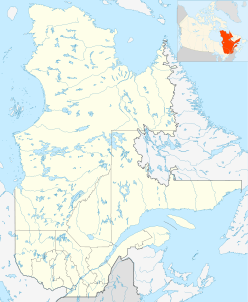Presqu'île crater facts for kids
| French: Cratère du lac de la Presqu'île | |
| Impact crater/structure | |
|---|---|
| Confidence | confirmed |
| Diameter | 24 kilometres (15 mi) |
| Age | less than 500 million years old (Cambrian period or earlier) |
| Exposed | Yes |
| Drilled | No |
| Location | |
| Location | Jamésie, Nord-du-Québec, Quebec |
| Coordinates | 49°43′N 74°48′W / 49.717°N 74.800°W |
| Country | Canada |
| Topo map | Canada NTS 32G10 |
The Presqu'île crater is a huge bowl-shaped hole in the ground in Quebec, Canada. It was made a very long time ago when a meteorite crashed into Earth. This amazing natural feature is found in the Jamésie area, which is part of the Nord-du-Québec region. It's quite close to the town of Chapais, about 3 kilometers (1.9 miles) south.
Contents
What is the Presqu'île Crater?
The Presqu'île crater is a large impact crater. This means it was formed when a space rock, like a meteorite, hit the Earth's surface. The impact was so powerful that it created a massive depression in the ground. Today, we can still see the remains of this ancient event.
How Do Craters Form?
Imagine throwing a pebble into sand or mud. It makes a little dent, right? Now, imagine a giant rock from space, called a meteoroid, traveling incredibly fast and hitting Earth. When it crashes, it's called a meteorite. The energy from this collision is enormous.
- First, the meteorite hits the ground at super high speeds.
- Second, a huge shockwave spreads out from the impact point.
- Third, the ground is pushed outwards and upwards, forming a bowl-shaped hole.
- Finally, some of the material that was blasted out falls back down, often forming a rim around the crater.
Over millions of years, things like wind, water, and ice can change the shape of these craters.
Exploring the Presqu'île Crater
The Presqu'île crater is one of the many impact craters found on Earth. It's a significant one because of its size and age.
Where is it Located?
This impressive crater is located in the northern part of Quebec, Canada. Specifically, it's in the Jamésie territory, which is a large area in the Nord-du-Québec region. Its exact coordinates are 49°43′ North and 74°48′ West. This means it's quite far north, in a wild and beautiful part of Canada.
How Old is This Crater?
Scientists estimate that the Presqu'île crater is less than 500 million years old. This makes it quite ancient! It formed during or even before a time called the Cambrian period. The Cambrian period was a time when many new types of life first appeared on Earth, like early sea creatures. Finding a crater from such a long time ago helps scientists understand Earth's history. The crater is also "exposed," meaning it's visible on the surface and not buried under layers of rock or ice.
Why Are Craters Important?
Studying impact craters like Presqu'île is very important for scientists.
- They help us understand the history of our planet and the solar system.
- They show us how often large objects hit Earth in the past.
- They can also teach us about the materials that make up meteorites.
- Sometimes, craters can even create unique environments for plants and animals.
 | William Lucy |
 | Charles Hayes |
 | Cleveland Robinson |


